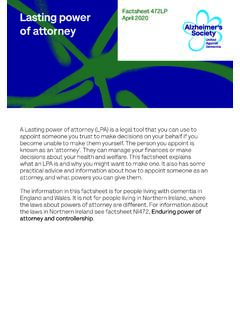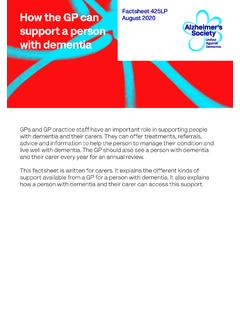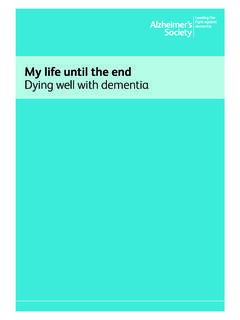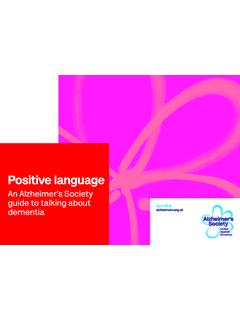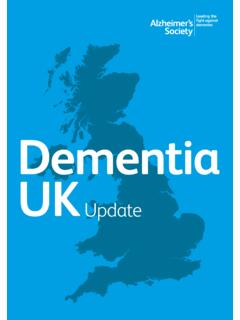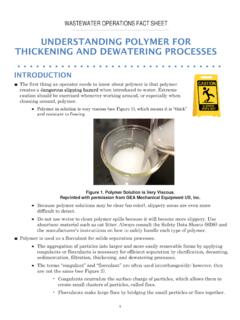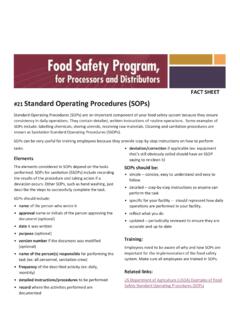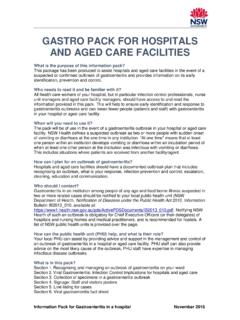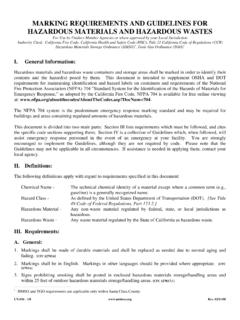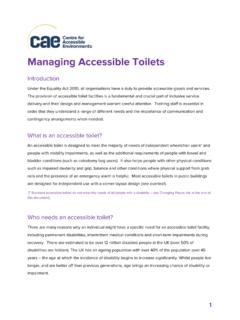Transcription of Assistive technology-devices to help with everyday living
1 Assistivetechnology devices to helpwith everydaylivingFactsheet 437LP April 2015 Dementia makes aspects of day-to-day life more difficult for the person living with the condition, and in some cases it may also put them at risk. Around the home, things like repeatedly mislaying keys can be frustrating, while others like leaving the gas unlit can be dangerous. This factsheet looks at some of the devices and technologies that can make getting on with life easier for people with dementia and their carers. It also suggests the steps someone can take if they think that they, or someone they are caring for, could benefit from some of s Society has worked with a number of other organisations to produce a Dementia-friendly technology charter that provides more information about Assistive technology and how it can help people.
2 This is available at n What is Assistive technology? nAssistive technology and dementia nWhat is available? nFinding the best solution nEthical considerations nOther useful organisationsAssistive technology devices to help with everyday living2 There are many different ways that devices can help people with dementia. This factsheet does not cover some basic items that can help people to cope with memory loss (such as a simple calendar, a noticeboard or sticky notes). For more information on these see Alzheimer s Society booklet 1540, The memory , items designed for problems with mobility, continence, sight and hearing are not considered to be Assistive technology. These include mobility aids, continence devices and pressure relief mattresses. For information about these types of solutions see factsheet 429, Equipment, adaptations and improvements to the is Assistive technology?
3 Assistive technology refers to devices or systems that support a person to maintain or improve their independence, safety and wellbeing. It tends to refer to devices and systems that assist people with memory problems or other cognitive difficulties, rather than those that are used to aid someone with mobility or physical difficulties. This factsheet summarises the types of device available in what is increasingly a fast-developing technology items can be found on the Alzheimer s Society online store. Many Assistive technology devices are electronic, but the term does not just refer to high-tech devices. However, devices such as smartphones and tablets, coupled with widespread internet coverage, are making technology more accessible for everyone in ways that we couldn t predict just a few years ago.
4 Widespread use of social media (such as Twitter and Facebook) also means that many people now live some of their life in a virtual environment, as well as in a more traditional face-to-face technologyDevices to help with everyday livingAssistive technology devices to help with everyday living3 All this means that the nature of Assistive technology for people with dementia is changing. Technologies and apps (applications or programs for smartphones and tablets) that have been developed for the general public are increasingly being used by people with dementia as well. Over time these mainstream technologies will probably replace many of the products that were developed specifically for people with dementia or can be used in a variety of ways, and for a variety of purposes. It can support people in carrying out everyday tasks and activities, enhance a person s safety, support their social participation, and monitor their health.
5 Assistive technology can help people who have problems with: nspeech nhearing and eyesight nsafe walking nfinding their way around nmemory and cognition (thinking and understanding) ndaily living activities such as bathing and cooking meals nsocialising and technology devices to help with everyday living4 Assistive technology and dementiaTechnology can give people with dementia help and support to remain independent, safe and socially involved. Carers may find it offers them support and reassurance as technology refers to devices or systems that support a person to maintain or improve their independence, safety and are the benefits?While Assistive technology may not be suitable for everyone with dementia, for some people it can bring benefits that help them to live well with the technology can: npromote independence and autonomy nimprove confidence and quality of life for a person with dementia nhelp manage potential risks in and around the home nsupport a person with dementia to live at home for longer nhelp with memory and recall nsupport a person with dementia to maintain some abilities nprovide reassurance to carers and help them to feel less technology devices to help with everyday living5 What are the potential difficulties?
6 Using Assistive technology has lots of potential benefits, but it also has its difficulties. Assistive technology can never replace human contact and interaction and it should never be used for this purpose. Doing so may lead to feelings of isolation and loneliness for the person with dementia. It is also important to be aware that Assistive technology will not eliminate risk. It can only assist people in improving their safety and wellbeing, not provide perfect Assistive technology (such as telecare or remote monitoring) is focused on increasing safety and reducing risk. Products may not have been designed with the specific wants of the person with dementia in mind and, as a result, there may be less focus on this. Instead, it is expected that the person will adapt to the technology, not the other way round.
7 Expecting the person with dementia to adapt, without listening to their views, can affect how keen they are to use the technology. This in turn will affect how successful it technology can also be quite expensive, especially some of the more high-tech devices, although it is often possible to rent these. This can be helpful, as the device or system may only be helpful for a short period of time because the person s needs may change as the condition devices or systems that monitor people, or that allow someone else to track them, may also raise ethical issues that should be considered. For more information see Ethical considerations on page technology devices to help with everyday living6 What is available?There are many different technologies that can be adapted to the needs of someone with dementia.
8 Some pieces of Assistive technology have been designed specifically for people with the condition but a lot of potentially helpful technology has not. Friends and family may already be using products or devices that could benefit a person with section gives an overview of some of the technologies, devices and services available, but does not go into detail about every type. Your local council social services, an occupational therapist or assisted living centre can provide advice and information on what is available types of technology may not be needed immediately, but it can be helpful to know what is available and what may be able to help in the future. Some of the devices may be used for more than one purpose, and how they are used will depend partly on the person who is using Assistive technology has lots of potential benefits, but it also has its difficulties.
9 Assistive technology can never replace human contact and interaction and it should never be used for this livingThese are devices that help someone who has difficulties with memory loss, orientation or communication that are affecting their daily prompts and remindersOne type of reminder, based on a motion sensor, plays a pre-recorded voice prompt when there is movement nearby. For example, a sensor placed near the front door could remind someone to lock the door, or one in the kitchen could remind someone to turn the oven kind of reminder does not detectmovement but is set to play a message at a certain time. For example, someone may record a message reminding them to take their medication or telling them that they have an appointment. They could also set their phone calendar to remind technology devices to help with everyday living7 Technology now also allows family members or other people not living with the person with dementia to access a tablet in the person s home and support them with reminders.
10 This means the person with dementia has a display of appointments, visitors and activities, as well as the reassurance of knowing where people who can help are and how to contact and calendarsThere are lots of products available to help people with dementia keep track of the day and date. Automatic calendar clocks can be helpful for people who lose track of which day it is. Many show both the date and day of the week. Some clocks also show clearly whether it is morning or evening. These can help prevent people getting confused about the time, particularly in the light summer evenings. Clock and calendar apps can also be downloaded for tablets, which you can set up to suit your own tastes and aidsThere are lots of different medication aids available. It may help to talk to a pharmacist about the best option.


